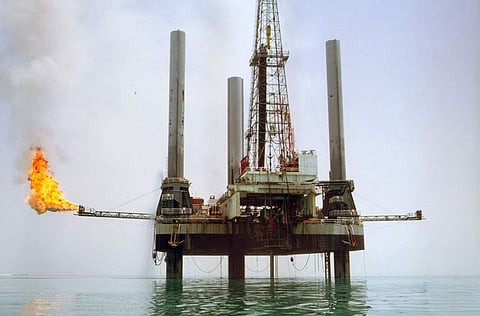Koreans to develop Abu Dhabi oil fields
Deal with Adnoc gives Seoul a 40 per cent stake in the multi-billion dollar project

Dubai: South Korea has signed a multi-billion dollar deal with Abu Dhabi National Oil Company (Adnoc) to develop three new oil fields.
The joint venture, under which Korea National Oil Corporation (KNOC) will take a 40 per cent stake with Adnoc retaining 60 per cent, is an attempt by the Asian powerhouse to secure oil resources, the country's leader said on Monday.
"We now have our own oil reserves in the Middle East," South Korean President Lee Myung-bak said in a statement. "Through this, stable crude supply to us is more guaranteed, and our energy security taken a big step forward."
The project involves two onshore and one offshore field that could take several years to produce oil, but is one of the first times that a non-European or American partner has waded into oil exploration and production in the Gulf.
The Korean consortium, made up of KNOC and another firm, GS Energy, is expected to invest $2 billion (Dh7 billion) of the estimated $5 billion total cost of developing the fields, the Korean government said in a statement.
Distinguished relations
General Shaikh Mohammad Bin Zayed Al Nahyan, Abu Dhabi Crown Prince and Deputy Supreme Commander of the UAE Armed Forces, yesterday said the agreement comes within the framework of distinguished bilateral relations and strategic partnership between the UAE and South Korea, and expressed his aspirations for further cooperation.
The deal gives South Korea access to fields with combined reserves of at least 570 million barrels of oil, to which Seoul has previously said it would have exclusive rights if other oil supply sources were disrupted.
Crude oil production is expected to begin in 2014, if the development starts as planned this month, and could rise to 43,000 barrels per day, Reuters reported yesterday.
Analysts told Gulf News yesterday that the deal was a significant coup for South Korea, but dismissed suggestions that it could shed light on how Abu Dhabi will choose to respond when two of its major concessions end in the coming years.
The end of the onshore Adco and Adma Opco concessions, which come in 2014 and 2018 respectively, have been closely watched by oil companies that hope Abu Dhabi will open the door to access to the region's reserves - previously dominated by western oil companies.
"I don't think that this is a clue for what they will do [when the concessions end]," said Samuel Ciszuk, an oil analyst at KBC Process Technology in London.
"Abu Dhabi obviously sees this is an opportunity to build a very strong relationship with South Korea and clearly the leadership of Abu Dhabi feels very comfortable with the leadership of South Korea."
Ciszuk added that the move was especially interesting as it marked a shift away from the traditional relationship in the oil and gas industry between the Gulf states and Europe, the UK and the US.
"Asia is very important for the Gulf states and the UAE in particular because it has been exporting most of its crude to Asian countries for some time," he said.
The deal comes just weeks after Abu Dhabi and South Korea signed a wide ranging Memorandum of Understanding (MOU), and soon after Kepco, the Korean energy giant, was granted the contract to build four nuclear reactors in the UAE.
GS Energy will have a six per cent stake in the 40 per cent Korean section of the joint venture.



